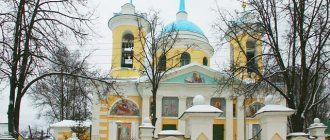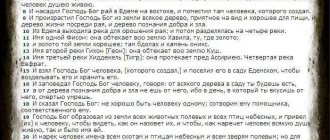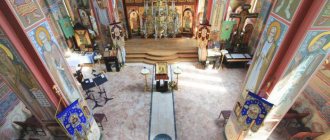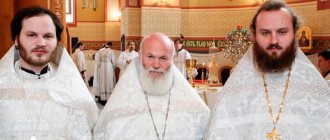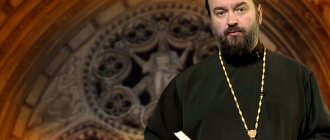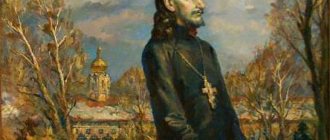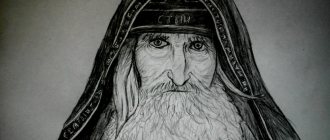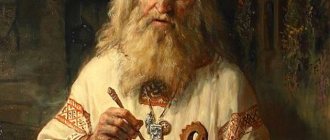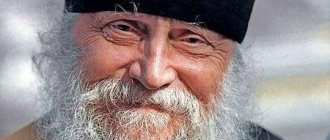Today, Orthodox people, more than ever, have the opportunity to freely, through various sources, become acquainted with the spiritual works of modern erudite and intelligent preachers and theologians, who do a lot to glorify the name of the Lord and provide answers to the most pressing questions of any Christian. Archpriest Oleg Stenyaev is one of them, and besides, he is a very famous publicist and missionary who captivates with his brilliant sermons, since he is original in his own way and everything he talks about cannot but resonate in human hearts. In many unbelievers he awakened true faith in God. Archpriest Oleg Stenyaev’s sermons in the form of videos, audio recordings and lectures can be watched or read on websites.
Biography
Archpriest Oleg Stenyaev was born in 1961 in the wonderful town of Orekhovo-Zuevo near Moscow. His entire family was Orthodox. Grandmother - Matryona Fedorovna - worked in the temple, she was a heroine mother, as she gave birth to 11 children. Her most hated and abusive word was “communist.”
Oleg Stenyaev’s grandfather was a front-line soldier, he worked anywhere but for the state - a stove maker, carpenter and builder. He never received an official salary or pension. Oleg's parents, as well as uncles and aunts, lived in every way adhering to God's laws, they all got married and baptized their children. None of them joined the Komsomol either.
The whole family lived alone on the banks of the Klyazma River in a large private house without a TV, but with a Bible. Not far from them there was a functioning Church of the Nativity of the Virgin.
Once in kindergarten, Oleg was noticed with a cross on his chest, which was immediately taken away from him by force and then thrown away. The boy was very upset and cried for a long time afterwards.
Childhood and adolescence
On April 8, 1961, a boy was born in the Russian city of Orekhovo-Zuevo, who was named Oleg. The beginning of the seventies bore the imprint of persecution before and after the war; children were baptized secretly, sometimes in the homes of clergy.
Archpriest Oleg Stenyaev
It is difficult for the modern generation to imagine how grandmother Matryona Fedorovna Zhuravleva managed to survive; the baby was sent to raise her; she served in the church, having eleven children. It’s incredible, but not a single one of Matryona Zhuravleva’s children became a Komsomol member or a communist, nor did a grandson wear a red tie.
The front-line grandfather who returned from the war was engaged in auxiliary work, was listed as a stove-laying foreman and earned his bread with his own hands. All the Zhuravlev children got married through a wedding, subsequently baptizing their grandchildren.
A private house on the banks of the Klyazma River was a special state within a state; there was never a television there, and free time was devoted to reading the Bible. Oleg experienced persecution back in kindergarten, when teachers tore off his cross, and the children constantly laughed.
The real torment began at school, when classmates became Octobrists, proudly wore red ties, and then felt like Komsomol heroes, the young man remained an outcast. The stubborn teenager was constantly summoned to the pedagogical council and various commissions; militant Komsomol members and communists repeatedly burst into the house on the banks of the Klyazma, demanding to give up the Holy Scriptures.
Not all teachers and students supported the school authorities' actions. Thus, the literature teacher forbade the trainee from having anti-religious conversations with the boy, respecting the views of the believing family.
Even in the early 80s, entering a university without a Komsomol badge was unrealistic. Children of believing parents had one path - to a vocational technical school.
Thus, a turner-borer appeared in a believing family, for whom the army was waiting ahead, new bullying in the troops of the Ministry of Internal Affairs. After the army, on the advice of his beloved grandmother, Stenyaev became a reader in church, and in 1981 he entered the seminary, but did not graduate for a number of reasons.
Personal life
While at the seminary, the young man met a beautiful girl from Western Ukraine, everything was heading towards marriage, but the Lord decided otherwise, allowing the young man to make his own choice.
The beginning of perestroika was a blow to the Orthodox churches of Western Ukraine when Greek Catholic worship was legalized there. Parishioners, together with their parishes, returned en masse to the Catholic faith.
Missionary meeting with parishioners
This event came as a shock to a true admirer of Orthodoxy; it was difficult for him to understand how, after being in Orthodoxy for so many years, Western priests abandoned the true faith.
The beloved girl persuaded the groom to accept the Greek Catholic faith, because she could not disobey her parents who had converted to Catholicism.
Not finding a common solution, the young people separated. The beautiful maiden became a nun in a Catholic monastery, and the young man accepted celibacy. For a short time, the lovers corresponded, but the discussion of the foundations of different religions and faith was not to the liking of the mother abbess; she forbade the young nun to communicate with her ex-groom.
After this event, the celibate priest became even more engaged in researching various movements in the Christian faith.
Studying at the seminary and beginning missionary work
Once, while visiting the library of the Trinity-Sergius Lavra, a young seminarian got into a conversation with a young man who turned out to be a Baptist.
The guys turned out to have many common topics; the Baptist’s parents wanted to meet the seminarian; they repeatedly invited the young man to their place in Moscow. Elderly people, second-generation Baptists, listened attentively to the seminarian, delving into their knowledge of the foundations of Orthodoxy.
Subsequently, the whole family accepted Orthodox baptism, their son became a priest and still serves in one of the churches in Moscow. Perhaps it was from communication with the Baptist family that Stenyaev began an in-depth study of the roots of the emergence of various confessions and sects, in which he was helped by Metropolitan Stefan Yavorsky, who wrote the treatise “The Stone of Faith.”
Oleg Stenyaev conducts lectures for students of theological seminaries
The young seminarian, finding himself among ordinary people, often attracted attention with his form; conversations began in transport, during which the missionary activity of the theologian began.
Many believers think that for missionary work they need to go to Africa or another country, but sometimes “Africa” lives behind the wall, knowing nothing about God and the gift of eternal life.
School
At school, too, everyone knew that Oleg Stenyaev was from a believing family, so one day a special commission was even created, which came to their home and suddenly saw a Bible on their table. The uninvited guests immediately began to be indignant about what the child was reading. But the grandmother was not at a loss, took a broom and “swept” them out of her house. This was the 70s, believers then no longer had to fear for their lives and behaved quite boldly. Then Oleg was encouraged to join the Komsomol, but he refused; surprisingly, the class supported him. Moreover, even the literature teacher Stanislav Andreevich - a disabled war veteran and a communist - defended him and believed that he was a normal student, and they were making an atheist out of him.
After graduating from school, Oleg went to work as a turner-borer, then he was drafted into the army to join the troops of the Ministry of Internal Affairs, and after that he decided that he would be a policeman. His grandmother did not approve of this and sent him to study at the seminary, but due to family circumstances he did not graduate. Then he was ordained a deacon, and he served in the Ivanovo, Tambov and Moscow dioceses.
Stolen Bride
One day he was faced with a choice: to marry or become a monk. He had a girlfriend from Western Ukraine, and Oleg decided to take her as his wife. But during Gorbachev’s Perestroika, the Greek Catholic Church was legalized, whose ritual was Orthodox and its faith was Catholic. The Lviv, Ivano-Frankivsk and Gomel dioceses left the Moscow Patriarchate. The bride's parents wanted him to accept their faith, but he refused. As a result, his bride became a nun in a Catholic monastery. Oleg had the brightest and kindest memories of her, they even corresponded at one time, but according to the rules of their order, letters had to be read in front of everyone and the abbess forbade them. From that moment on, Stenyaev developed a special passion for polemics with heterodox people. After all, thanks to them, he was left without a bride.
Dissenter
In 1990, just before the collapse of the USSR, he read an article in the newspaper Pravda that the Patriarch was praying for unity in the CPSU. This was the reason that Oleg Stenyaev moved to a non-canonical Orthodox association - a community that broke away from the ROCOR. Then he served in the Marfo-Mariinsky monastery. But when the Soviet regime collapsed, he came with repentance, he was forgiven, especially since he returned the Martha and Mary Convent under the control of the Russian Orthodox Church, although before that he gathered his clergy and parishioners, where they jointly decided to return to a single Church.
Oleg Stenyaev graduated from theological seminary as an external student, and then from the Moscow Theological Academy, and was elevated to the rank of archpriest. Since 2004, he has served as a cleric of the Church of the Nativity of John the Baptist (Moscow, Sokolniki district). Stenyaev became the author of a number of programs on Radio Radonezh and chairman of the Missionary Review newspaper. He headed the Center for the Rehabilitation of Victims of Non-Traditional Religions, thanks to which more than three thousand people became Orthodox.
Chechen War
During the first war in Chechnya in the early 90s, Stenyaev visited the Russian military more than once, he baptized many of them, and simply handed out crosses, and even Muslims who served there took them for themselves. The soldiers explained this by saying that they were fighting for Russia.
Archpriest Oleg Stenyaev went to the second Chechen war on a charitable mission, he distributed warm clothes and food to peaceful people in the city of Grozny. And then one day their minibus was stopped by Chechen militants. They were very lucky that one Chechen recognized Stenyaev, as he saw him handing out cereal and condensed milk to children in the square. They were released, but the car stalled. Stenyaev understood that they could now easily be put in a cold and dark hole. He took out some alcohol and took a sip to warm himself up and cheer himself up a little. The militants began to deal with their engine. Stenyaev spoke to one of them and asked why they were still detaining three Orthodox priests in captivity, to which he replied that they were not priests, but paratroopers - sports FSB officers.
Turning to Stenyaev, he said that it was immediately clear from him that he was a Russian priest - fat, arrogant, drunk and not afraid of anything. And he added that Allah will punish the one who touches him. After this, the priest got into his transport. The militants pushed their minibus and they drove on. Yes, it’s not for nothing that they say that there are no atheists in war.
International Missionary Ministry
The missionary Stenyaev is known in India and Chechnya; his actions, according to researchers, were not always correct, but the faithful son of God with an open heart carries the message of true salvation throughout the world.
The 1999 trip to the cities of India was filled with bright events. When visiting Russian cultural centers and meeting with representatives of the Russian diaspora, the theologian tried to reach people through lectures and sermons, telling them about Christ.
Interesting! The missionary was surprised by the reaction of the Indians, who are constantly in a state of amazing peace, even during tragedies.
In Delhi, a preacher was shocked by the story that Christians in India are lower than untouchables, street cleaners. Father Oleg asked to introduce him to such a Christian; he turned out to be a janitor, whom the holy father hugged and presented with a rosary as a souvenir.
The priest traveled thousands of kilometers across Chechnya in the 90s, risking his life, giving lectures to soldiers, among whom there were many Muslims. Surprisingly, many Muslims also took the cross brought by missionaries, believing that it would protect, although they understood the danger. If a Muslim with a cross was captured, he was tortured especially cruelly.
The missionaries also brought letters from children from Russia to the soldiers; the defenders believed that children’s messages were protected better than bulletproof vests. With tears in his eyes, the holy father recalls baptism in Chechnya, when an unbaptized soldier found a baptized colleague, took him as godparent, and thus they became related through the holy blood of Jesus Christ.
Archpriest Oleg Stenyaev: “Apocalypse”
Oleg Stenyaev’s book, which he called “Conversations on the Apocalypse,” turned out to be quite interesting and very exciting. In it, he began studying the most complex biblical book, “The Revelation of John the Theologian,” or “Apocalypse” (Greek translation). He deciphers it in a modern way. Not every priest and theologian will undertake this interpretation, but Oleg Stenyaev did everything in the most magnificent way. At first he simply held conversations with parishioners on these topics, but then he was asked to create a book, which many of the believers now read with great pleasure. On the Internet you can even see a video lecture by Archpriest Oleg Stenyaev, which has an identical title to the book.
Modern ministry of the archpriest
Technological progress in the form of the Internet has given the archpriest access to a huge number of listeners and viewers. The Spas channel has become an arena for discussions led by Stenyaev in the “Priest’s Answer” program.
Archpriest Oleg Stenyaev takes part in conversations on Radio Radonezh
The portal "Exeget.ru" through a series of conversations about the Apocalypse helps believers delve into the book of the Apostle John "Revelation"
More than once the priest had to deal with fans of the emo youth movement. The seasoned exegete Stenyaev was especially impressed by the vampire girl who drank other people’s human blood and shared her own.
The Holy Father managed to break the strongholds of Satan and return the girl to the fold of Orthodoxy. When meeting with Satanists, the priest first tried to interest his interlocutor in something abstract, and only then moved on to the main question of saving the soul.
The priest-exegete believes that in order to achieve the main goal of missionary work, finding common themes is the first step in gaining trust.
Spiritual heritage
In 1996, the world was given the book “Jehovah's Witnesses. Who are they?”, the author discussed this topic in more detail in 2004 in the recording of discussions “Dispute with Jehovah’s Witnesses.”
Seeing the dominance of the Hare Krishnas, the archpriest explores this movement, revealing all its lies in the book “Hare Krishnas. Who are they?".
Oleg Stenyaev’s book “Exam without the right to retake”
The theologian outlined his spiritual reflections on the temptations of the modern world in the books “Man in the Face of Temptations: Conversations on the Holy Scriptures” and “How We Can Avoid Temptations Today.”
For church-going Orthodox believers, it will be a real godsend to find answers to many questions in the message “Conversations on the Gospel of Matthew.”
“Conversations on the Book of Genesis”, “Conversations on the Council Epistle of the Holy Apostle James” help believers better navigate the New Testament.
